Yavuz Selim Kartal
VADIS -- a VAriable Detection, Interlinking and Summarization system
Dec 20, 2023Abstract:The VADIS system addresses the demand of providing enhanced information access in the domain of the social sciences. This is achieved by allowing users to search and use survey variables in context of their underlying research data and scholarly publications which have been interlinked with each other.
Overview of the SV-Ident 2022 Shared Task on Survey Variable Identification in Social Science Publications
Sep 19, 2022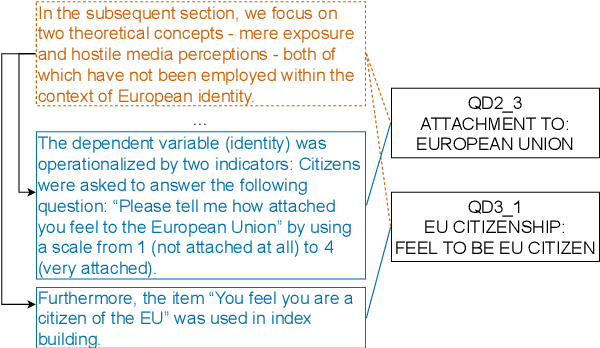
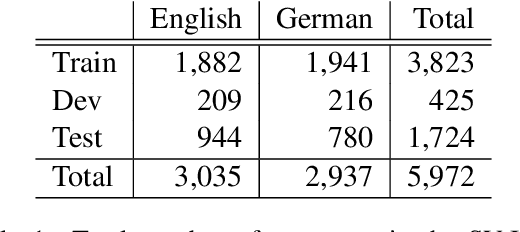
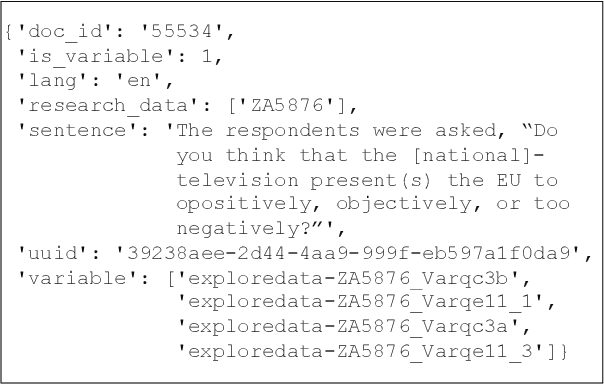
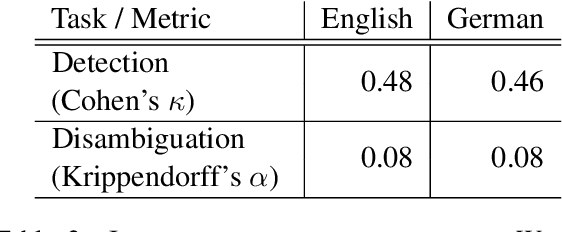
Abstract:In this paper, we provide an overview of the SV-Ident shared task as part of the 3rd Workshop on Scholarly Document Processing (SDP) at COLING 2022. In the shared task, participants were provided with a sentence and a vocabulary of variables, and asked to identify which variables, if any, are mentioned in individual sentences from scholarly documents in full text. Two teams made a total of 9 submissions to the shared task leaderboard. While none of the teams improve on the baseline systems, we still draw insights from their submissions. Furthermore, we provide a detailed evaluation. Data and baselines for our shared task are freely available at https://github.com/vadis-project/sv-ident
Towards Automated Survey Variable Search and Summarization in Social Science Publications
Sep 14, 2022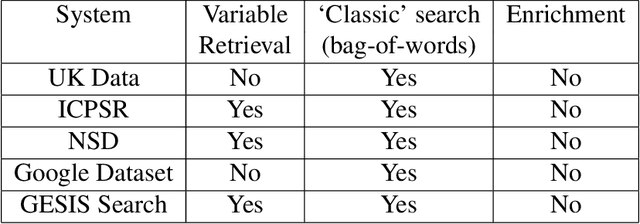

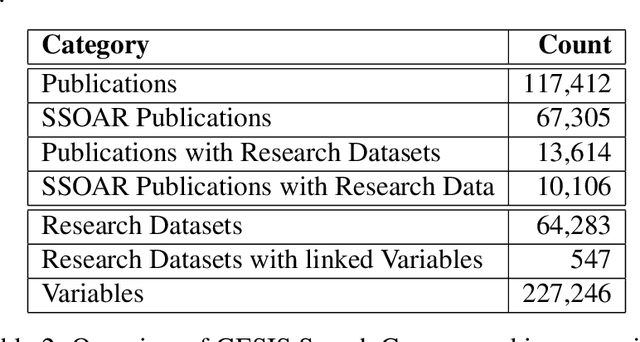
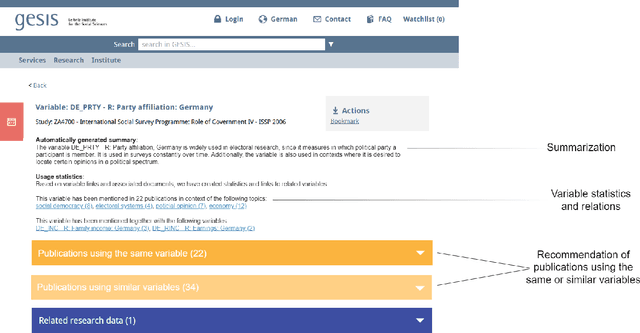
Abstract:Nowadays there is a growing trend in many scientific disciplines to support researchers by providing enhanced information access through linking of publications and underlying datasets, so as to support research with infrastructure to enhance reproducibility and reusability of research results. In this research note, we present an overview of an ongoing research project, named VADIS (VAriable Detection, Interlinking and Summarization), that aims at developing technology and infrastructure for enhanced information access in the Social Sciences via search and summarization of publications on the basis of automatic identification and indexing of survey variables in text. We provide an overview of the overarching vision underlying our project, its main components, and related challenges, as well as a thorough discussion of how these are meant to address the limitations of current information access systems for publications in the Social Sciences. We show how this goal can be concretely implemented in an end-user system by presenting a search prototype, which is based on user requirements collected from qualitative interviews with empirical Social Science researchers.
Overview of the CLEF--2021 CheckThat! Lab on Detecting Check-Worthy Claims, Previously Fact-Checked Claims, and Fake News
Sep 23, 2021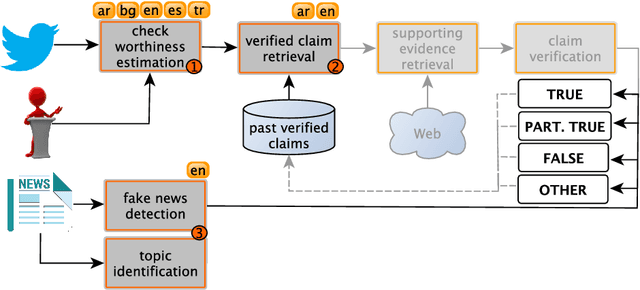
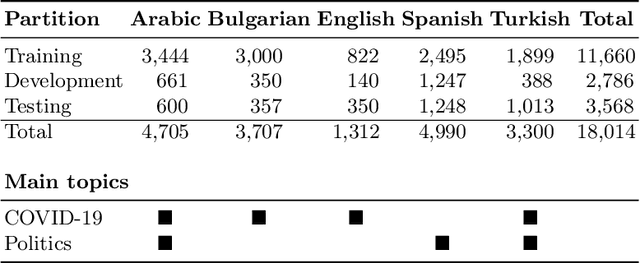

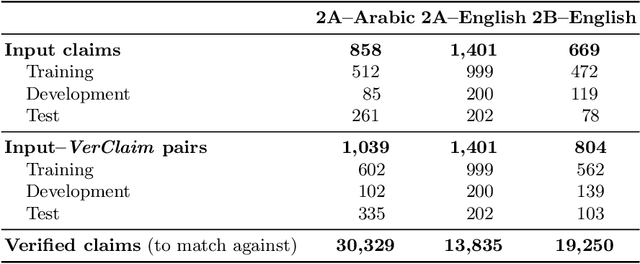
Abstract:We describe the fourth edition of the CheckThat! Lab, part of the 2021 Conference and Labs of the Evaluation Forum (CLEF). The lab evaluates technology supporting tasks related to factuality, and covers Arabic, Bulgarian, English, Spanish, and Turkish. Task 1 asks to predict which posts in a Twitter stream are worth fact-checking, focusing on COVID-19 and politics (in all five languages). Task 2 asks to determine whether a claim in a tweet can be verified using a set of previously fact-checked claims (in Arabic and English). Task 3 asks to predict the veracity of a news article and its topical domain (in English). The evaluation is based on mean average precision or precision at rank k for the ranking tasks, and macro-F1 for the classification tasks. This was the most popular CLEF-2021 lab in terms of team registrations: 132 teams. Nearly one-third of them participated: 15, 5, and 25 teams submitted official runs for tasks 1, 2, and 3, respectively.
* Check-Worthiness Estimation, Fact-Checking, Veracity, Evidence-based Verification, Detecting Previously Fact-Checked Claims, Social Media Verification, Computational Journalism, COVID-19
Too Many Claims to Fact-Check: Prioritizing Political Claims Based on Check-Worthiness
Apr 17, 2020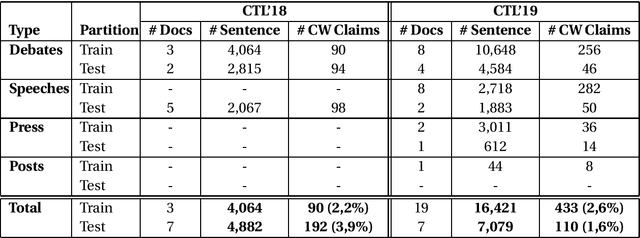

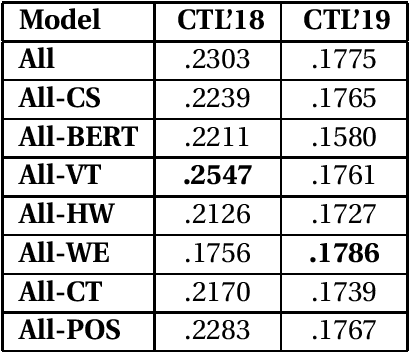
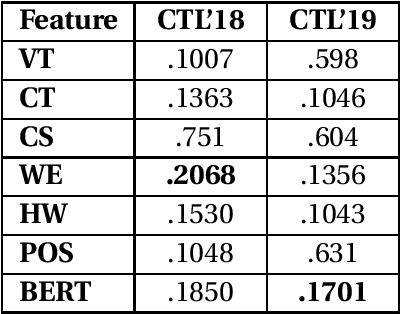
Abstract:The massive amount of misinformation spreading on the Internet on a daily basis has enormous negative impacts on societies. Therefore, we need automated systems helping fact-checkers in the combat against misinformation. In this paper, we propose a model prioritizing the claims based on their check-worthiness. We use BERT model with additional features including domain-specific controversial topics, word embeddings, and others. In our experiments, we show that our proposed model outperforms all state-of-the-art models in both test collections of CLEF Check That! Lab in 2018 and 2019. We also conduct a qualitative analysis to shed light-detecting check-worthy claims. We suggest requesting rationales behind judgments are needed to understand subjective nature of the task and problematic labels.
 Add to Chrome
Add to Chrome Add to Firefox
Add to Firefox Add to Edge
Add to Edge